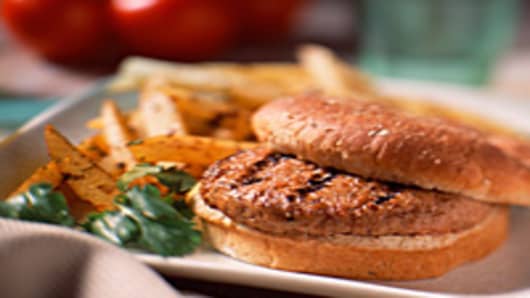Stock up that buffet table: Working through lunch may not be such a great thing, as a hungry trader makes for a risky trader.
So suggests a recent study from the British Psychological Society that found people are more prone to take financial chances when their bellies are growling than when they've been well-fed.
"[O]ur animal instinct to maintain a balanced metabolic state influences our decision-making in other contexts, including finance," the BPS said in discussing the results of a study in which 19 men faced the same gambling choice a week apart.
The participants were asked to select between pairs of choices, including one that had both a higher risk and higher chance of return. They made the decisions after a 14-hour fast; immediately after eating a 2,000-calorie meal; or one hour after a 2,000-calorie same meal.
The study found risk aversion to be at its highest immediately after consuming the big meal, though the results varied depending on hormonal changes and body types.
One market pro found parallels between the real world of tradingand the study on appetite and risk-taking.
Nicholas Colas, chief strategist at BNY ConvergEx Group in New York, said such behavioral economics do help to explain behavior in the financial markets.
"When I worked at a large (Connecticut)-based hedge fund a few years ago, I always wondered why the company kitchen was so well stocked with chips, sodas and other snacks. At my next trading gig, the company founder insisted on having lunch, as a group, every day at exactly noon," Colas wrote Monday in an analysis.
"Whether they knew it or not, both fund managers knew that staying well fed is actually a risk management tool, at least if the BPS study is any guide. Hungry traders are, well, riskier traders."
The nascent discipline has its limits, though: Colas doubts theories of some economists that extending unemployment benefits is acting as a disincentive to those idled looking for work.
He cites a recent study highlighted as well in BPS that surveyed 98 college students and found they preferred activity—even if it was unproductive—to idleness.
Though the study drew no conclusions vis-a-vis the unemployment compensation debate, Colas noted that there has been considerable chatter over whether unemployed people have grown content to living off the government dole, and an extension of the argument is whether people would rather be working or idle.
"The idleness study highlights a central problem in behavioral economics—it’s a long leap from research based on 100 college kids to making government policy," Colas wrote. "In narrow slices, the discipline can inform and entertain—hungry traders taking risk is a good example. But curtailing unemployment benefits simply to push some portion of those left with no income into low paying jobs is too large a leap for most people."



